|
|
|
Sort Order |
|
|
|
Items / Page
|
|
|
|
|
|
|
| Srl | Item |
| 1 |
ID:
118376
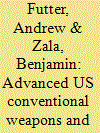

|
|
|
|
|
| Publication |
2013.
|
| Summary/Abstract |
The Obama administration has made a great effort to increase the role of advanced conventional weaponry in US national security thinking and practice, in part to help reinvigorate the global nuclear disarmament agenda by reducing the role played by nuclear weapons in the US defense posture. However, such a strategy is fundamentally flawed because increases in US conventional superiority will exacerbate US relative strength vis-à-vis other powers, and therefore make the prospect of a nuclear weapon-free world seem less attractive to Washington's current and potential nuclear rivals. Consequently, it is highly likely that the impact of efforts to increase US advanced conventional superiority through ballistic missile defense and a conventional "prompt global strike" program will ensure that the Obama administration is adopting a pathway to nuclear abolition on which it is the sole traveler for the foreseeable future.
|
|
|
|
|
|
|
|
|
|
|
|
|
|
|
|
| 2 |
ID:
146521
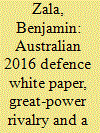

|
|
|
|
|
| Summary/Abstract |
This piece is an imagined email correspondence between three renowned international relations scholars, E. H. Carr, Hedley Bull and Coral Bell, who are discussing the Australian 2016 Defence White Paper. The purpose of such an exercise is to reflect on the ‘big-picture’ international relations questions posed by what might otherwise be thought of as a relatively technical defence policy document. In particular, the correspondence between the three focuses on the central importance of the White Paper’s assumptions of a ‘rules-based global order’ and the relationship between this order and US power. In their time, all three authors spoke directly to questions of power, law and order in their scholarly work, which had been deeply influenced, in all three cases, by periods spent working at the ‘coalface’ of these issues in government in Britain and Australia. As such, Carr, Bull and Bell have much to say about how Australia is positioning itself for a post-unipolar world.
|
|
|
|
|
|
|
|
|
|
|
|
|
|
|
|
| 3 |
ID:
151644
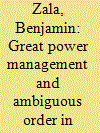

|
|
|
|
|
| Summary/Abstract |
This article considers what the nineteenth century can tell us about the nature of great power management under conditions of ambiguity in relation to the holders of great power status. It charts the development of an institutionalised role for the great powers as managers of international society but with a specific focus on the mutual recognition, and conferral, of status. Such a focus highlights the changing, and sometimes competing, perceptions of not only which states should be thought of as great powers, but also therefore whether the power structure of international society remained multipolar or shifted towards bipolarity or even unipolarity. The article argues that a ‘golden age’ of great power management existed during a period in which perceptions of great power status were in fact more fluid than the standard literature accounts for. This means that predictions surrounding the imminent demise of the social institution of great power management under an increasingly ambiguous interstate order today may well be misplaced.
|
|
|
|
|
|
|
|
|
|
|
|
|
|
|
|
| 4 |
ID:
109546
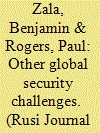

|
|
|
| 5 |
ID:
152707


|
|
|
|
|
| Summary/Abstract |
The literature on the current global order is confused over its polarity. Depictions of a current multipolarity are found alongside discussions of the longevity of US-led unipolarity, while others point to the early stages of US–Sino-dominated bipolarity. These competing visions of the interstate order sit uneasily within the existing literature that both defines polarity in terms of the distribution of material capabilities and makes system-level predictions based on the assumption that all actors perceive polarity objectively. This article outlines the need for a more analytically eclectic understanding of polarity. Exploring the possibilities of a deeper engagement between the realist literature on structural power and the constructivist literature on perception, agency, and performativity, it puts forward a redefinition of polarity in which perceptions of status replace a focus on the distribution of capabilities. An analysis of the Cold War period—normally depicted as a clear case of unbroken bipolarity—demonstrates the usefulness of this reconceptualization.
|
|
|
|
|
|
|
|
|
|
|
|
|
|
|
|
| 6 |
ID:
158644
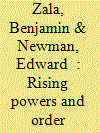

|
|
|
|
|
| Summary/Abstract |
A central theme of the literature on rising powers is that new aspirants to great power status pose a challenge to the underlying principles and norms that underpin the existing, Western-led order. However, in much of the literature, the nature and significance of rising powers for international order are imprecisely debated, in particular the concept and practice of ‘contestation’. In this article, we aim to establish a distinction between normative contestation and what can be thought of as ‘contestation over representation’: that is, contestation over who is setting and overseeing the rules of the game rather than the content of the rules themselves and the kind of order that they underpin. The paper engages with debates on international order and international society, and its empirical basis is provided by a thorough analysis of the discourse of rising power summitry.
|
|
|
|
|
|
|
|
|
|
|
|
|
|
|
|
| 7 |
ID:
142305


|
|
|
|
|
| Summary/Abstract |
With the rise of new centres of power, the environment in which British decision-makers attempt to create an effective foreign and defence strategy is undergoing a profound change. Benjamin Zala argues for a three-pronged response. First, finding a way of building a national strategy for a world in which new powers are rising in different ways and at different rates that avoids the conceptual dead ends of a ‘networked' and ‘nonpolar' world. Second, revisiting the debate over the costs and benefits of the US alliance in light of the potential return of major-power alliances for the first time since the Second World War. Third, pursuing a British approach to multilateralism and global-governance reform that reflects the decreasing dominance ofthe West.
|
|
|
|
|
|
|
|
|
|
|
|
|
|
|
|
|
|
|
|
|